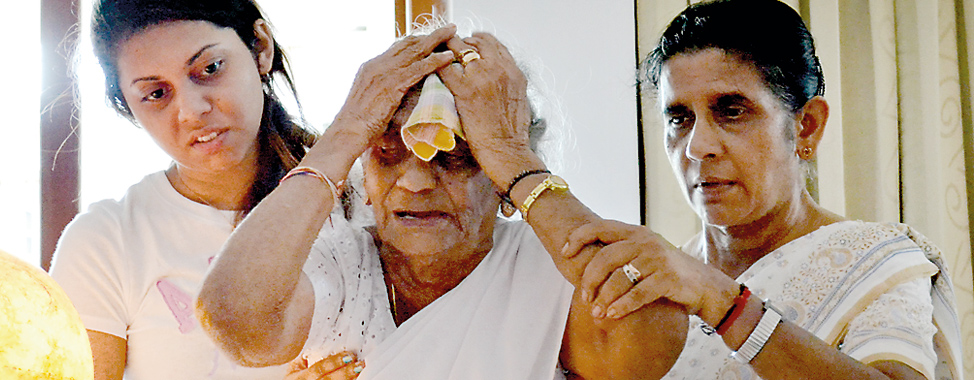News
Faults and frauds of a failed finance firm
Papers submitted to the Court of Appeal last week revealed that there had been gross financial irregularities, mismanagement and fraud — among other shortcomings — at Central Investment Finance Limited (CIFL) over a period of time. The documents also showed that the Central Bank of Sri Lanka (CBSL) had possessed detailed information about the company’s activities as far back as 2011. However, CIFL was allowed to canvass for and take deposits till recently, when its liquidity crisis came to a head and forced the regulator to appoint a managing agent.
One of the papers filed in court is the report of an onsite examination of CIFL conducted by the CBSL in 2011. Its findings are based on information gathered and verified from the books and records of the company as at April 30 that year. The report, which the Sunday Times accessed, states that CIFL was dependent on new deposits to meet expenses and repayments, “thus operating as a ponzi scheme”. It said the company had no earnings from 61.4% of assets concentrated on real estate.
“CIFL, which is in the Aspic Group, continues unethical, fraudulent business practices specifically with respect to real estate transactions similar to those found in the other group companies such as Industrial Finance Ltd (IFL), a distressed RFC,” it says.
It is observed that the overall finance condition of the company had significantly deteriorated. The report says that the quality of assets, total accommodation, profitability and capital of the company indicate a declining trend. Non-performing accommodations (NPA) –loans that are in jeopardy of default — were at 27.2% where the industry average is 8.7%.
CIFL was found to be non-compliant with several CBSL directions and displayed “numerous credit administration weaknesses”. For instance, the company was run without a dedicated credit committee, which is an advisory body that guides credit-related activities.
At the time of inspection, CIFL had not put in place a system of proper customer evaluation. One company it had lent money to not only had inadequate cash flow projections, the integrity of some of its directors was in doubt. Furthermore, it had recently been incorporated as a business that was 100 per cent funded by CIFL.
Another company that borrowed from CIFL had, among other things, a negative cash flow. The credit file had no information at all about a third customer. Yet another company was in a weak financial position due to operating losses, negative net worth and cash flows. Loans were also given to some individuals without security.
The regulator found that CIFL was following unethical credit-related practices. For example, post-dated cheques were accounted for in the customer ledger cards without these actually being deposited in the respective banks. The company did not hold legal ownership for six properties amounting to Rs. 984 million of the balance sheet and 97 per cent of its real estate assets. It had title to just three properties worth Rs. 42 million.
Several investments accounted for in the balance sheet could not be established with documentary proof, the report says. The company took mortgages amounting to Rs. 775.2 million against five properties for its joint venture project in Homagama. At the time of inspection, the mortgages were not registered with the respective land registries.
“Examiners perceive that the valuations taken for the mortgage bonds are exorbitantly overstated and have requested valuation reports of the same properties which are yet to be submitted,” the onsite report states.
The report also lists out some fraudulent real estate transactions. For instance, a letter was issued by a director of CIFL to the chief executive officer of CIFL to settle his outstanding loan at CIFL of nearly Rs. 12 million, to pay the stamp duty of more than Rs. 1 million for a land transfer and to pay him (the director) more than Rs. 1.5 million and the excess of Rs. 11.2 million to be placed as a fixed deposit under his name. The company carried out the instructions of this director, who is a well-known lawyer, in September 2010.
The same director is named in relation to several other transactions — including deposits and loans — in the category of ‘Fraudulent activities taken place in transactions related to Real Estates’. “None of the above deposits and loans was included in the OEX forms (which require disclosure of transactions with directors) submitted for the onsite examination,” the report says.
In June 2011, CIFL had unpaid, matured deposits amounting to Rs. 57.6 million. Notwithstanding this, two directors (one of whom was the lawyer mentioned above) had withdrawn their own deposits from the company. A letter from the CBSL to the company’s board of directors dated July 2011 was also placed before court. In it, the regulator has instructed CIFL to comply with its directions and to rectify the issues raised. But it was not clear from the submitted documents whether the company had obeyed.
This letter observes that, despite difficulties faced by the finance industry during 2009-2011, CIFL had managed to report profits amounting to Rs. 2.1 million and Rs. 13.74 million respectively. But a detailed analysis of the components of earnings revealed that a major part of the reported income comprised unearned income, which actually should have been eliminated when accounting for profits.
“Therefore, at present, CIFL’s performance is exaggerated by accruing unearned income from joint venture projects carried out in collaboration with Aspic Homes,” it says.
The letter cites Corporate Governance Direction No. 3 of 2008, which holds the board of directors of a registered finance company responsible for ensuring the strength, safety and soundness of the company.
“Our overall conclusion (after perusing the Board Minutes for the years 2009, 2010 and 2011 April) is that the Board of CIFL has failed in achieving this objective,” it says.
Man dies after failed attempt to get money for heart surgery
With no money to pay for an angiogram or for the surgery doctors said he needed, Rienzie de Silva started Ayurveda treatment for his heart ailment. On the morning of October 6, he visited a practitioner of native medicine in the hope that his illness could be cured without an operation. He returned home, ate lunch and went to sleep, only to wake up in a fit of coughing.

A mother’s grief: The victim’s mother with his daughter and his sister
He told Lilani, his wife, that he wasn’t feeling well and she gave him water. “Then he held his chest and shouted, ‘I’m in pain, I’m in pain, please take me to the doctor’.”
He was pronounced dead on admission to hospital. Mr. de Silva’s family insisted last week that he died because they couldn’t withdraw their savings from the failed Central Investments and Finance PLC (CIFL) in time for surgery. The 58-year-old from Moratuwa had worked as a manager in a private company but his salary was just enough to meet monthly expenses. They have three children between the ages of 28 and 18.
It was Ms. de Silva who had encouraged her husband to place their savings with CIFL. “I heard Hudson Samarasinghe talk about the company on his morning show,” she said, referring to the chairman of Sri Lanka Broadcasting Corporation whose programme was sponsored by CIFL. “He said it was a reputable company registered with the Central Bank.”

The victim: Rienzie de Silva
So they invested Rs. 1 million 10,000 in five fixed deposits and drew various amounts as interest on each block. The payments stopped abruptly in March 2013. Meanwhile, one of their daughters needed money for an international exam. Since all of their deposits were maturing in May, the couple went to CIFL in early April to withdraw their money.

Lilani: Tears for a dead husband. Pic by M.A. Hasitha Kulasekera
They were turned away. They returned in mid-April. “Other CIFL depositors were also at the office,” Ms. de Silva recounted. “We sat there from 8am to 7pm to get just our interest. But we didn’t get our capital.”
By the end of April, she says, her husband developed chest pains and was diagnosed with heart disease. He was advised to subject himself to an angiogram. The doctor said he would most likely need a bypass operation.
Pleading letters to the President, to the regulator and to other authorities followed. They went to the Fraud Investigation Bureau, to no avail. On one futile visit to CIFL, a director told them that the CBSL had proposed a repayment plan which would see them getting some of their money back within seven years.“My husband was distraught,” Ms. de Silva said.
“He kept asking me how he would survive for seven years. I tried to reassure him the best I could but I had no convincing answer. We had already borrowed money from a cousin to pay for our daughter’s exam. There was no way we could borrow again for the operation.”
Ms. de Silva went to CIFL several times a month. In a confrontation with a CIFL director, she shouted angrily, “You will have to answer if my husband’s condition gets worse.”
At the foot of Mr. de Silva’s coffin, his 87-year-old mother weeps. A few yards away, a display cabinet holds medals, shields and certificates awarded him for a four-year stint in war-torn Iraq. He built the family home with the money he had earned there. But it’s a far cry from his family’s current reality. Last week, Ms de Silva was forced to ask her brother for money to meet his funeral expenses.
Cabraal says CB will encourage mergers within financial sectors
Over the next year, the Central Bank of Sri Lanka (CBSL) will encourage mergers and consolidations within the banking and non-banking financial institution (NBFI) sectors, Governor Ajith Nivard Cabraal said yesterday.
His comments to the Sunday Times come amidst fresh efforts by the regulator to set more stringent standards for finance companies. Last week, four new directions were issued by the Monetary Board in an effort to tighten controls.
They are listed on the official website of the Government Printing Department as the Finance Companies (Writing off of Accommodations) Direction; the Finance Companies (Debt Instruments) Direction; the Finance Companies (Liquid Assets) Direction; and the Finance Companies (Interest Rates) Direction.
The content of the directions was not immediately available. “As of now, about 90 per cent of the assets, deposits and advances in the NBFI sector are held by 20 NBFIs,” Mr. Cabraal said. “The other 38 companies account for the balance 10 per cent. Hence, there is a tailor made opportunity to encourage mergers and acquisitions.”
Industry observers had warned that there were far too many finance companies than could be effectively regulated while experts had urged the CBSL to facilitate mergers of existing ones rather than issue new licences.
Authoritative sources said the regulator has also made some internal changes to facilitate better monitoring of the non-banking finance sector in future.
Several finance companies were revealed to be facing liquidity pressures in recent times. The CBSL was forced to intervene in the case of one, Central Investments and Finance Ltd, which is now being managed by People’s Leasing and Finance Company PLC.
Maninda Wickramasinghe, country head of Fitch Ratings Lanka Ltd, welcomed the CBSL’s initiative to encourage more mergers and consolidations.
“Finance companies lend to the same sectors as banks but, of course, people who are more creditworthy will go to the banks,” he said. “It is people that banks are not likely to lend to that go to finance companies. To that extent, they are open to that higher risk.”
“At the same time, they also have smaller capital bases,” he observed. “Finance companies must have bigger capital bases. They must be larger so that they can be more diverse and be able to absorb shock in times of stress.” He also said that it must be made compulsory for finance companies to obtain ratings and for those ratings to be published.
comments powered by Disqus
